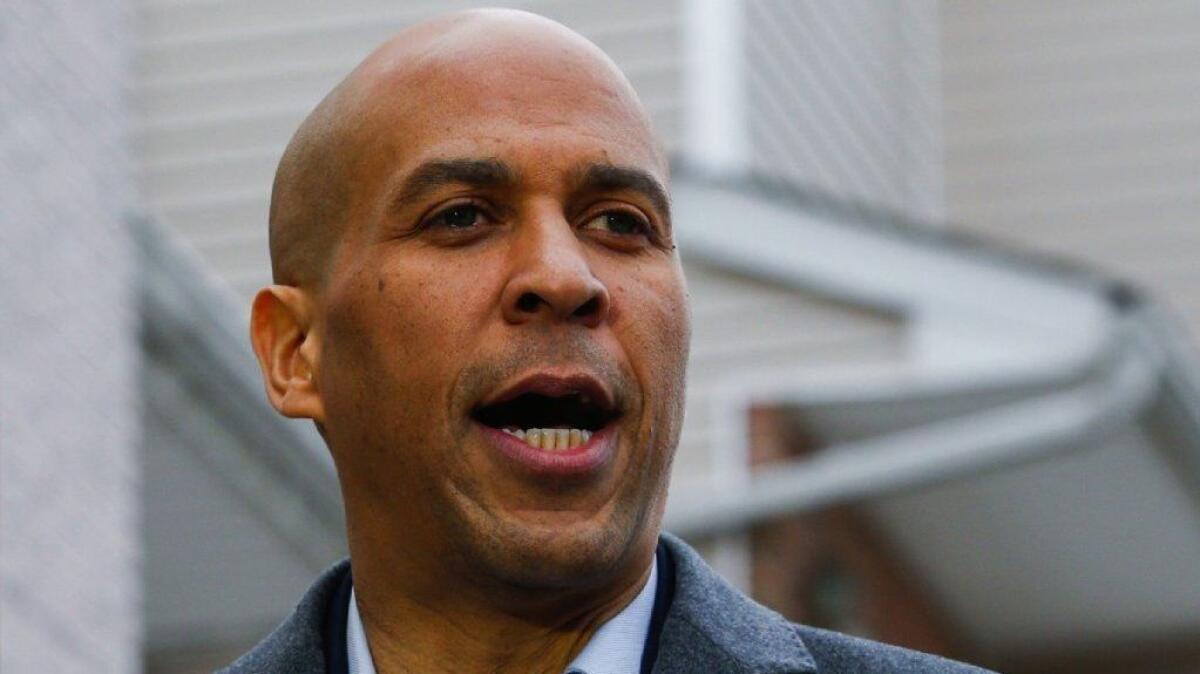Charter schools, long divisive among Democrats, could shadow presidential hopefuls

Reporting from Newark, N.J. â When Cory Booker, as mayor of this city, recruited a Republican governor and philanthropists from Wall Street and Silicon Valley for a radical experiment in school choice that alarmed teachers and rattled the community, he framed the move as a civil rights pursuit worth risking his political future over.
That risk now awaits him on the presidential campaign trail.
For the record:
2:15 p.m. March 6, 2019An earlier version of this article stated that Shavar Jeffries of Democrats for Education Reform was a former Newark City councilman. Jeffries is the former president of the Newark School Advisory Board.
Since his election to the Senate from New Jersey in 2013, Booker has tamped down his fervor for charter schools. But the zeal with which he pursued school privatization in his hometown threatens to inhibit his path to the White House.
He is not the only Democrat in that politically awkward spot.
Just a few years ago, the appetite for school privatization ran strong in parts of the Democratic Party. It has waned since, but candidates seeking the Democratic nomination include some of the movementâs biggest backers.

Do you know what a charter school is? Are you sure?
They likely will encounter strong headwinds in primaries where voter sympathy for striking educators in Los Angeles, Oakland and West Virginia has positioned teachersâ unions to wield serious power. In several of the recent strikes, the explosive â and often loosely regulated â growth of charters was a central complaint.
In 2016, teachersâ unions quickly got behind the candidacy of Hillary Clinton and faced a backlash from some activist members over her affinity with charters. That experience has union leaders putting candidates like Booker on notice that they will have to answer for their records.
American Federation of Teachers President Randi Weingarten said recently that she is not ruling out an endorsement of Booker or any other charter enthusiast before teachers have a chance to grill the candidates at a town hall. But she acknowledged their records would make them a tough sell.
âI have heard from some people that they view it as a complete impediment,â she said in an interview on CSPAN.
Teachers are suspicious not only of Booker. The Obama administrationâs aggressive pursuit of charter expansion through Race to the Top, the signature K-12 education policy of his administration, will have former Vice President Joe Biden facing tough questions from teachers, should he join the race.
Former New York City Mayor Michael R. Bloomberg, a billionaire who donates generously to school choice efforts and a potential candidate, helped expand the number of charter schools in New York from 22 to 159 while in office.
Sen. Elizabeth Warren of Massachusetts once advocated shifting public education to an âall-voucher system.â Loosening the âironclad relationship between location-location-location and school-school-school would eliminate the need for parents to pay an inflated price for a homeâ and provide a âshakeoutâ that might address economic segregation, she wrote in 2003.
Here in Newark, charters, and Bookerâs role in advancing them, remain deeply divisive.
âThere was damage done here,â said John Abeigon, president of the Newark Teachers Union, interviewed in his ragged office on the periphery of the rapidly gentrifying downtown.
âTeachers across the country are fighting back against corporate vouchers and privatization. They know what those things can do to a district, and inevitably they end up pointing to what happened in Newark. The reformers had carte blanche here, and this is the result: segregation in the classroom and denial of education to a certain class of students.â
âTeachers do not forget,â he added.
The latest look at the Trump administration and the rest of Washington Âť
Among the grievances that charter opponents will not forget is Bookerâs past alignment with Betsy DeVos, now President Trumpâs Education secretary and a figure reviled by union activists and their allies. Booker voted against her confirmation, but years earlier delivered a spirited keynote speech at a policy summit her organization held in which he defended school choice and private school vouchers.
Education has divided Democrats for years. Unlike healthcare or tax cuts or climate change, issues on which party members generally share goals, even if they disagree about tactics, education advocates disagree fiercely not just about the best path for fixing ailing schools but, more than a decade into the charter movement, about how it has changed school districts -- and even if communities welcome it.
âThe core policies that Cory Booker pushed in Newark are at the heart of what parents support,â said Shavar Jeffries, a former president of the Newark School Advisory Board who now runs Democrats for Education Reform, a pro-charter group. âThis should absolutely be an asset for his campaign.â
But those policies werenât an asset for Jeffries when he ran to succeed Booker as mayor. The race turned into a referendum on the education alliance Booker forged during his tenure in Newark with then-Gov. Chris Christie, whose administration had control of the cityâs schools at the time.
Jeffries lost to Ras Baraka, a public school principal who had led the fight against the Booker plan.
Jeffries argues voters were not dissatisfied with the proliferation of charters, but by the way outsiders, mostly white policy advocates affiliated with Christie and national philanthropies, imposed their agenda on an overwhelmingly black and Latino city.
âToo many white people were coming in to run Newarkâs schools and make decisions,â said Jeffries, who is black. âWe needed a space for Newarkers to drive the change.â
Critics of the charter effort assess the situation more harshly.
âIt was like a hostile takeover here,â said Deborah Smith-Gregory, the local NAACP president. Charters have segregated students and divided communities, she says, pointing to studies showing the expansion of charters here left district schools absorbing a disproportionate number of children with serious special needs and limited English.
âIt is not a good situation,â she said.
Roughly one in three Newark children now attend a charter school, some 18,900 students.
Bookerâs allies argue the new schools have undeniably created new opportunities for low-income African American students, and parents of children whose kids have won placement in top-performing charters speak glowingly of the opportunity.
âThere is not a city in America that has experienced a greater expansion of educational opportunity than Newark over the last decade,â said Ryan Hill, CEO of KIPP New Jersey charter schools. He points to test score results showing African American kids in Newark are now four times as likely to enroll in a school where students outperform the state average than they were in 2006.
âIt was not a pretty process. There were protests. There were people whose job it was to protect the status quo,â he added. âBut the upshot is that everybody said this would come at the expense of the district schools, and they got better during this time period too,â said Hill.
Thatâs a hotly disputed assessment, even among some of Bookerâs dear friends.
âIt was just a disaster,â said Wilhelmina Holder, a parent activist and family friend and otherwise admirer of Booker. âIt did not work at all. It was such a caustic, dark time for Newark.â
The impact of charters here is difficult to assess in part because the charter proliferation coincided with other changes that had a role in lifting student achievement. An infusion of money flowed into the district as a result of long-running litigation pursued by the nonprofit Education Law Center. The state also launched a major expansion of pre-K programs in Newark.
Bookerâs critics say his charter push â which Booker used as a springboard to national celebrity â undermined those other programs that more equitably raised student achievement.
âThere was this significant effort to strengthen and reform schools, and Mayor Booker showed no interest,â said David Sciarra, executive director of the Education Law Center. âHe was missing in action.â
The frustration is echoed by Pedro Noguera, who ran an effort in Newark to boost public schools by bringing in social and medical service providers to address crucial nonacademic student needs. Nogueraâs âGlobal Villageâ program, which Baraka warmly embraced at the school he headed as principal, was abandoned soon after the Booker-Christie plan was put in motion.
âIt became very clear Mayor Booker wasnât interested,â said Noguera, now an education professor at UCLA. âHe was only interested in charter schools. There was this antipathy toward public schools.â
Like other states, New Jersey is starting to tap the brakes on charter growth. Gov. Phil Murphy called for a âtimeoutâ on new charter school approvals during his 2017 campaign, and the state recently rejected a raft of applications for new charters.
That slowdown resembles the situation in California, where Gov. Gavin Newsom and Tony Thurmond, the newly elected state superintendent of public instruction, are strong allies of teachersâ unions, and legislative Democrats are moving swiftly to address the complaints raised by picketing educators. Lawmakers are promising to impose new restrictions and transparency measures and to slow the growth of the schools.
As for Booker: On the day he launched his presidential bid last month, he vowed in Newark that he would ârun the boldest pro public school teacher campaign there isâ and touted the gains public schools made under his tenure as mayor. He noted the New Jersey Education Assn. had endorsed his Senate run.
But he is asked about schools constantly on the campaign trail.
âI had to turn that city around,â Booker said in Iowa last month. âOur schools system had dramatically failing schools. Now we are the No. 1 city in America for âbeat the oddsâ schools: high poverty, high performance.â
More stories from Evan Halper Âť
More to Read
Get the L.A. Times Politics newsletter
Deeply reported insights into legislation, politics and policy from Sacramento, Washington and beyond. In your inbox three times per week.
You may occasionally receive promotional content from the Los Angeles Times.











